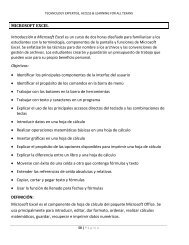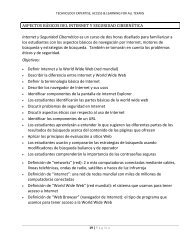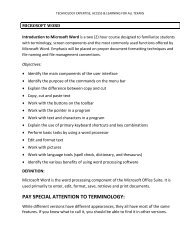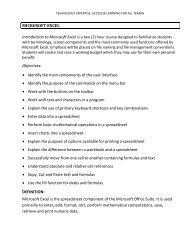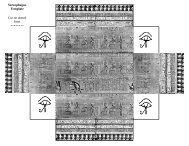Begin with the End in Mind: A Records Management & Archives ...
Begin with the End in Mind: A Records Management & Archives ...
Begin with the End in Mind: A Records Management & Archives ...
Create successful ePaper yourself
Turn your PDF publications into a flip-book with our unique Google optimized e-Paper software.
F<strong>in</strong>d<strong>in</strong>g aids vary <strong>in</strong> <strong>the</strong> level of detailed description <strong>the</strong>y provide users. S<strong>in</strong>ce archivists<br />
describe materials at <strong>the</strong> group level, often based on series—as opposed to libraries, which<br />
describe on <strong>the</strong> item level (for example, a book)—<strong>the</strong> descriptions are <strong>in</strong>tended to give<br />
patrons an overview that provides <strong>the</strong> context of <strong>the</strong> material. In o<strong>the</strong>r words, archives<br />
patrons should not view one document <strong>in</strong> isolation, but ra<strong>the</strong>r <strong>in</strong> relation to o<strong>the</strong>r documents<br />
<strong>with</strong><strong>in</strong> <strong>the</strong> legislator's body of records.<br />
6.5 Reference: Access and Use<br />
Archivists don't preserve records simply to save <strong>the</strong>m from destruction and deterioration or<br />
for some o<strong>the</strong>r political or personal motivation; <strong>the</strong>y<br />
want <strong>the</strong> public to use <strong>the</strong>m. Archivists provide<br />
reference services "to aid patrons <strong>in</strong> locat<strong>in</strong>g materials<br />
relevant to <strong>the</strong>ir <strong>in</strong>terests." In order to facilitate this,<br />
archivists conduct a reference <strong>in</strong>terview <strong>with</strong> <strong>the</strong><br />
patron. This allows <strong>the</strong> archivist to assess <strong>the</strong> patron's<br />
research <strong>in</strong>terests and <strong>in</strong>formation needs, assist <strong>in</strong><br />
identify<strong>in</strong>g relevant collections and <strong>in</strong>struct <strong>the</strong> patron<br />
<strong>in</strong> <strong>the</strong> proper handl<strong>in</strong>g and use of <strong>the</strong> archival<br />
material.<br />
6.5.1 Restricted <strong>in</strong>formation<br />
Texas State <strong>Archives</strong>, circa 1990s, TSLAC<br />
Archivists understand that certa<strong>in</strong> series of records found <strong>in</strong> legislative collections, such as<br />
constituent correspondence and case work, may conta<strong>in</strong> personal and legally protected<br />
<strong>in</strong>formation. Before provid<strong>in</strong>g access to such <strong>in</strong>formation, archivists follow specific<br />
procedures, as codified <strong>in</strong> Texas law, for review<strong>in</strong>g material before its release to <strong>the</strong> public.<br />
The records, however, may be requested for research under <strong>the</strong> provisions of <strong>the</strong> Public<br />
Information Act (V.T.C.A., Government Code, Chapter 552). The researcher may request an<br />
<strong>in</strong>terview <strong>with</strong> an archivist or submit a request by mail, fax or e-mail, <strong>in</strong>clud<strong>in</strong>g enough<br />
description and detail about <strong>the</strong> <strong>in</strong>formation requested to enable <strong>the</strong> archivist to accurately<br />
identify and locate <strong>the</strong> <strong>in</strong>formation requested. If <strong>the</strong> Texas State <strong>Archives</strong> review reveals<br />
<strong>in</strong>formation that may be excepted by <strong>the</strong> Public Information Act, archivists are obligated to<br />
seek an open records decision from <strong>the</strong> Attorney General on whe<strong>the</strong>r <strong>the</strong> records can be<br />
released. The Public Information Act allows <strong>the</strong> <strong>Archives</strong> ten work<strong>in</strong>g days after receiv<strong>in</strong>g a<br />
request to make this determ<strong>in</strong>ation. The Attorney General has 45 work<strong>in</strong>g days to render a<br />
decision. Alternately, <strong>the</strong> <strong>Archives</strong> can <strong>in</strong>form <strong>the</strong> patron of <strong>the</strong> nature of <strong>the</strong> potentially<br />
38


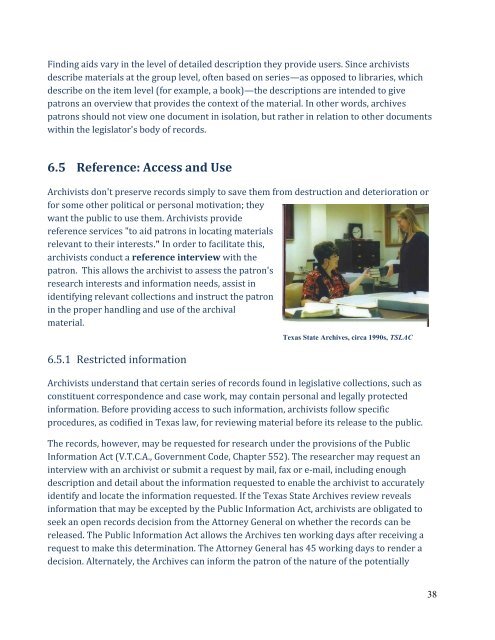

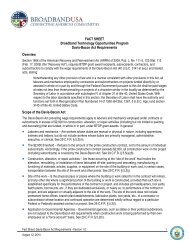

![Harry Potter [pdf]](https://img.yumpu.com/27329912/1/190x245/harry-potter-pdf.jpg?quality=85)
![Aplicaciones del Programa de Libros que Hablan [pdf] - Texas State ...](https://img.yumpu.com/27329907/1/190x245/aplicaciones-del-programa-de-libros-que-hablan-pdf-texas-state-.jpg?quality=85)


